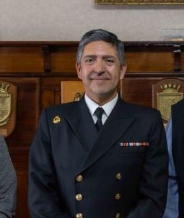Andrew Valls
In December 2023, part of our research team traveled to southern Chile, visiting Punta Arenas and Puerto Williams, to better understand how climate change is affecting the most extreme regions of South America and the world. This expedition, the second undertaken by our research group, focused not only on collecting scientific data but also on capturing the multiplicity of voices from people of various backgrounds and how their experiences contribute to a broader and deeper understanding of environmental and social issues.
Encounters in Punta Arenas
In Punta Arenas, we engaged with various individuals involved in highly relevant educational and research projects.
Nineth Barrientos and students from Liceo Juan Bautista Contardi, for example, shared their deep motivation for climate action, concern for the future, and awareness of microplastic pollution. They collaborate with New Zealand on the TOTCUS project, developing research on microplastics in the area.
Dr. Carla Ximena Salinas Silva, a member of the Chilean Antarctic Institute (INACH), discussed the impact of introduced species on the Antarctic ecosystem. Her interest in our project and the possibility of future collaborations open doors to research on the diversity and social and economic dynamics in sub-Antarctic regions.
We met prominent scientists from the University of Magallanes and the Climate and Resilience Science Center (CR2), such as Dr. Juan Carlos Aravena, Dr. Paulina Aldunce, Dr. Rodolfo Sapiains, and Dr. Laura Sánchez Jardón. Their work ranges from dendrochronology to governance and climate change adaptation. While each has a different focus, they all expressed interest in collaborating and contributing their expertise to our project.
Voices of Puerto Williams
In Puerto Williams, the diversity of voices was even more pronounced.
Andrea Seguel, a 16-year-old from the Yagan community, provided a clear perspective on the environmental and social issues her community faces. Her vision underscores the importance of preserving the collective memory and culture of the Yagan people, areas that still require concerted effort.
José Soto, businessman and former mayor, identified emerging social issues, such as the scarcity of potable water. Though his perspective centers on economic development, his experience as a former mayor offers valuable insights into the challenges and opportunities in Puerto Williams.
Yamila, a restaurant owner and migrant, shared her experience in this extreme region, highlighting her satisfaction with life in Puerto Williams. Her story adds a human dimension to the dynamics of migration and adaptation.
Juan Pablo Zamora and Javier Godoy, fishermen, discussed the changes in their activity due to climate change, such as the alteration in the life cycles of king crabs, the main source of income in these southern waters, and the adverse climatic conditions affecting their primary income source. These testimonies illustrate how climate change is transforming traditional practices and the local economy.
María Jesús Anguita Campos, a retired teacher and long-term resident of Puerto Williams, expressed concerns about education and the mental health of young people, reflecting how climatic and social changes impact the community.
Manuel Flores, a crew member of the Yaghan ferry, noted how milder winters are boosting tourism and attracting international investments. However, he also pointed out changes in wind patterns, affecting navigation and fishing.
Commodore Jorge Castillo Fuentes of the Chilean Navy in Punta Arenas provided a geopolitical perspective, highlighting the strategic importance of Puerto Williams and the complexities of its urban development.
Final Reflections
The diversity of voices and contexts we encountered on this journey underscores the richness of perspectives surrounding climate change and its impact on the southernmost territories of Chile. From motivated students and dedicated scientists to indigenous communities and local entrepreneurs, each voice contributes an essential piece to the puzzle of sustainability and resilience.
This mosaic of experiences and knowledge not only enriches our scientific understanding but also pushes us to consider more inclusive and collaborative approaches to addressing climate change challenges. Unifying these multiple voices and perspectives is crucial for developing comprehensive and sustainable solutions that benefit all communities in the territory. We invite you to watch the related videos available on our website.








